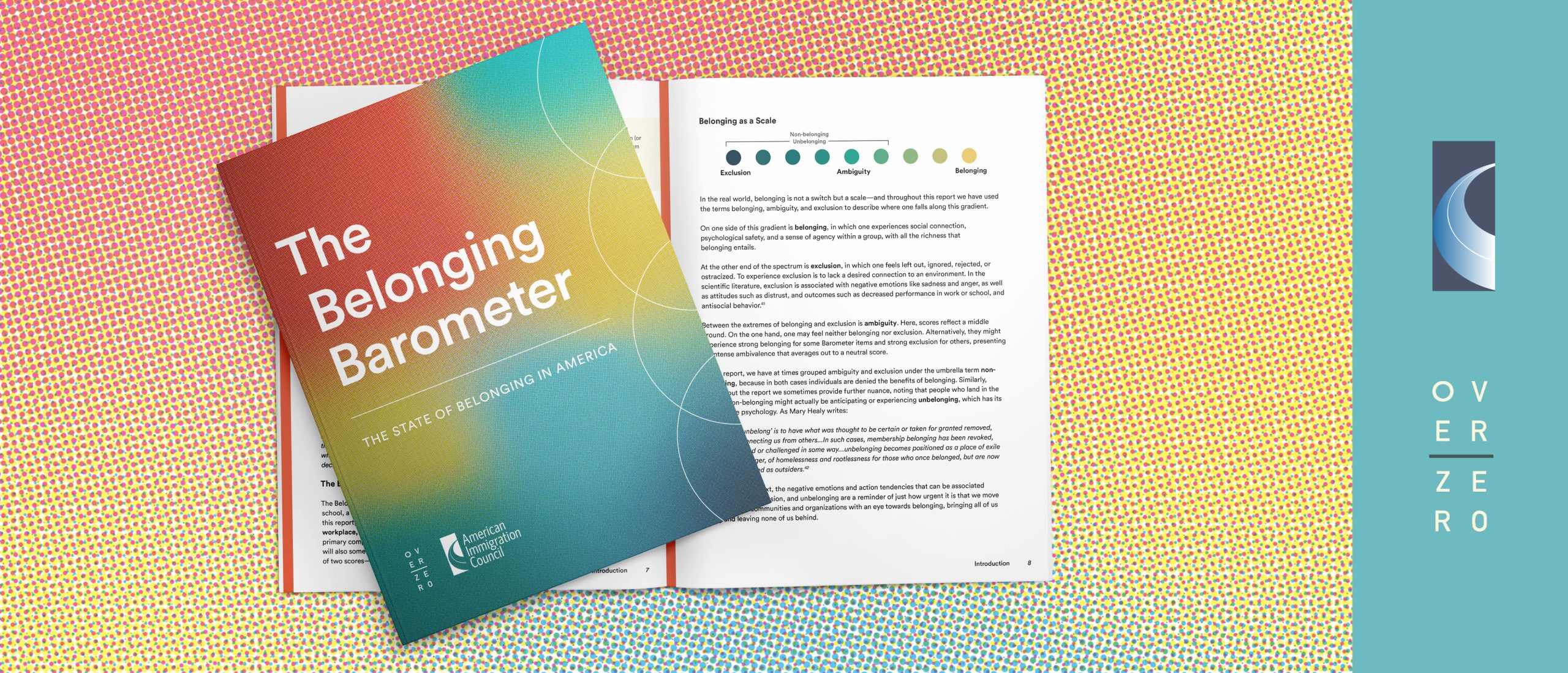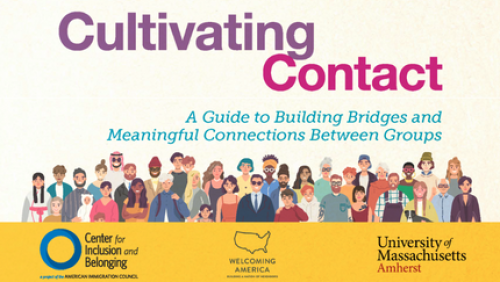Belonging is a fundamental human need, and one that is linked to many of the most complex challenges of our time.
Without a sense of belonging, individuals and communities suffer; with it, they thrive. Yet, because belonging is notoriously difficult to measure, it is often ignored when attempting to address the deep fractures in our societies.
One purpose of this report is to call attention to belonging as a factor that matters deeply for leaders and stakeholders across diverse sectors. We make the case for including belonging in the design and implementation of programs and policies across all areas of life in the United States. A second purpose is to propose a nuanced new tool for measuring belonging—the Belonging Barometer—that is robust, accessible, and readily deployable in the service of efforts to advance the common good. As with any new tool, it is our hope that the Belonging Barometer can, and should, be refined and improved upon over time. We offer it up to changemakers across the world and welcome feedback and collaboration.
In this report, we review the concept of belonging and introduce a new measure, the Belonging Barometer. We then describe initial findings based on a nationally representative survey regarding the relationship between the Belonging Barometer and health, democracy, and intergroup dynamics in the United States. Next, we report on the state of belonging across five life settings: family, friends, workplace, local community, and the nation. Lastly, we briefly discuss emerging themes and considerations for designing belonging interventions. We present findings from an exploratory analysis of the dataset and include statistically significant analyses regardless of effect sizes in the hopes that future researchers will continue expanding upon this work.
The Belonging Barometer: The State of Belonging in America was produced by Over Zero and the Center for Inclusion and Belonging at the American Immigration Council.
Key Findings
- Belonging is measurably multifaceted. Belonging is about the quality of “fit” between oneself and a setting. When one belongs, they feel emotionally connected, welcomed, included, and satisfied in their relationships. They know that they are valued for who they are as well as for their contributions, they can bring their whole and authentic self to the table, and they are comfortable expressing their thoughts and opinions regardless asto whether they diverge from dominant perspectives. In addition, they understand how things work within a given setting, feel treated equally, and perceive that they are able to influence decisions.
- Belonging is vital for American society. Belonging Barometer scores were associated with critical life outcomes in health (e.g., better general health; increased life satisfaction; decreased pain, stress, and loneliness, experiences in the workplace (e.g., increased retention and greater willingness to recommend one’s job), social cohesion (e.g., higher satisfaction with local community; increased trust in one’s neighbors, other local residents, other Americans, local government, and U.S. government; more civic engagement, increased confidence that residents’ involvement in their community can change the way it is run; more engagement with local social actions; decreased feelings of marginalization (as measured by fear of demographic change) at the local and national levels; and more openness to diversity), and democracy (e.g., greater satisfaction with life and democracy in the United States; increased support for democracy).
- A majority of Americans experience non-belonging (ambiguity or exclusion) in the workplace, their local communities, and/or the nation. We use non-belonging as a cumulative term that includes people who ranked in the bottom two thirds of the Barometer measure, categorizing those who scored between 2.34 and 3.66 as unsure or ambiguous about whether they belong and those who scored between 1 and 2.33 as experiencing exclusion. Sixty-four percent of Americans reported non-belonging in the workplace, 67% in the nation, and 74% in their local community. Further, 17% of Americans did not report experiencing belonging in any of the life settings that we measured, and a very small subset (0.6%) reported experiencing exclusion in all life settings. The lack of belonging may hold significant costs to individuals, institutions, and our society as a whole. At the same time, a majority of Americans (60%) reported family belonging, and a majority of Americans (57%) reported friend belonging.
- Socioeconomic status and other demographic factors are strongly associated with belonging. We found that across life settings Americans were more likely to report belonging if they also saw themselves as better off or much better off economically than the average American. Other associated factors included being older (for all life settings); identifying as a man vs. a woman (for family, nation, and workplace); and identifying as heterosexual (straight) vs. homosexual (gay), bi/pansexual, asexual, or queer (for family, friends, and nation). Belonging also correlated with race (local), and religion (family, local, national, and workplace). The association of socioeconomic status and other demographic factors with belonging suggests that belonging interventions—in families, workplaces, friend groups, local communities, and at the national level—would benefit from being designed with an eye towards the systemic factors that influence individual experiences.
- A substantial percentage of Americans feel they are treated as “less than others” in their daily lives. Specifically, 20% reported feeling treated as less than others when interacting with local law enforcement, 15% reported feeling treated as less than others when voting, 21% reported feeling treated as less than others when interacting with local elected officials, and 15% reported feeling treated as less than others when shopping at local stores. Experiencing indignities was associated with reporting less belonging across all life settings—not only in local communities, but also nationally, in the workplace, and even among friends and family. The Americans who reported being treated as “less than” tended to be younger, non-citizen immigrants, identify as non-white, identify as men, identify as not heterosexual (straight), and/or reported lower subjective socioeconomic status. People in the range of demographic categories who reported being treated as “less than others” in their local communities suggests a broad social breakdown in civic norms and behavior, or at least the experience of such, among a wide set of groups. It also presents an opportunity for local communities to inquire about whether their residents experience indignity in daily interactions, and to seek to address any issues.
- Our research suggests that belonging and diversity are related, an insight that will grow increasingly important as the United States becomes increasingly diverse. Americans with more diverse friendships reported higher levels of overall friendship belonging. Moreover, non-Hispanic white Americans living in ethnically/racially diverse neighborhoods reported less fear of demographic change as they experienced more local belonging. Our research suggests that there is a relationship between belonging and diversity, and we encourage future researchers and practitioners to explore this interaction more deeply. However, our survey also reveals that large percentages of Americans lack friendships with people of a different race/ethnicity, partisan affiliation, religion, sexual orientation, socioeconomic status, or country of origin.
In today’s polarized, socially segregated, and increasingly diverse America, investments in belonging are more urgent than ever. Fortunately, there is burgeoning research on how to design effective belonging interventions, and there are already organizations and communities piloting such work. As work in this space continues, understanding what is and what is not working, and why, will be critical for advancing the field. While this report serves as a “snapshot” of belonging in the United States today, the Barometer (and further variations and versions of the tool) can be adapted to measure levels of belonging over time (e.g., for workers, students, residents, citizens), or to track pre- and post-intervention changes. Our hope is that by creating an increasingly robust measure, it will be possible to tailor interventions to improve belonging, and to identify the interventions that work best within a particular context.




